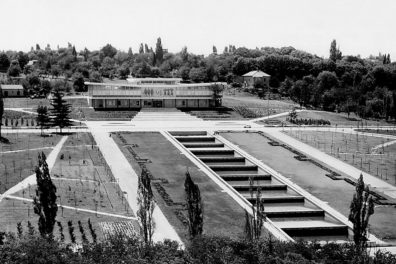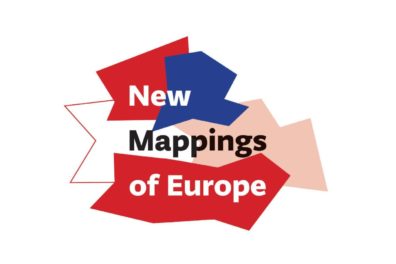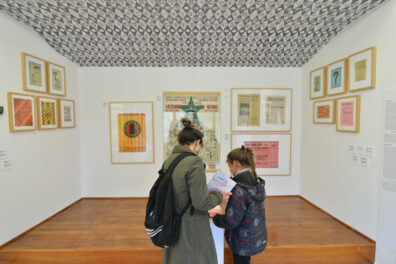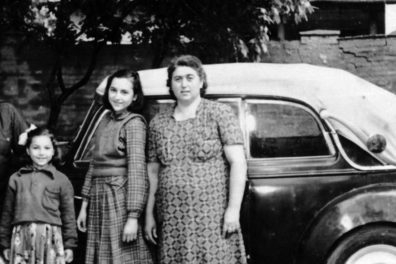
Letter to Haralampije – a bibliophile rarity
In the spiritual climate of the Enlightenment—a broad intellectual and ideological movement that swept through the entire 18th century—Dositej Obradović (c. 1739–1811) stood out as a great Serbian enlightener, reformer, writer, translator, and the first Minister of Education in Serbia. He was the founder and professor of the Great School, the precursor to the University of Belgrade. Thanks to his extensive education gained through travels across Europe, he became one of the most learned Serbs of his time. His entire body of work marked a turning point in the history of Serbian literature. On one hand, he established the vernacular as the foundation of modern literature, and on the other, he introduced European literary and cultural traditions. His creative opus is imbued with reflections, lessons, and advice addressed to readers on how to live their lives according to the ideals of truth and virtue. Realizing that the people were the fundamental force behind cultural and national progress, Dositej devoted all his efforts to their cultural upliftment, while at the same time fiercely opposing the spiritual estate, which he saw as the greatest adversary of Enlightenment ideals. His entire educational mission had a popular character and reflected the social and cultural aspirations of all layers of the population. It aimed to liberate the masses from ignorance and bring them enlightenment. In this way, people would attain spiritual freedom through the dissemination of scientific truths via the written word. “Books, my brothers, books… not bells and baubles! Books, the precious and priceless gift from heaven, the proud daughters of enlightened minds!” Dositej exclaimed.
Letter to Haralampije, or Dear Haralampije, is Dositej’s first printed work, addressed to his friend Haralampije Mamula in Trieste. The letter was published in Leipzig in April 1783 and serves as a kind of plea for help in printing his work Advises of Common Sense. As book printing was very expensive at the time, Dositej was forced to seek assistance from Haralampije, believing that some “man from Sarajevo or Trebinje, Novi Sad or Osečina” might be found who could finance the publication of his work.

Among the holdings of the Library’s Josip Broz Tito collection is a bibliophile edition of Letter to Haralampije. This is a commemorative edition with special technical and artistic features, presented and dedicated to President Josip Broz Tito by the editorial team of the publishing house Prosveta from Belgrade for his seventieth birthday, on May 25, 1962. For many years, the book was kept in the vault of Villa “Mir” (“the Marshal’s private residence”). It was published in 1961 to mark the 150th anniversary of the death of Dositej Obradović.
The edition was reproduced in only 57 copies, measuring 29 x 52 cm, and executed in screen printing on 23 sheets of Finnish birch veneer. The covers were made of plywood, coated in purple velvet, and decorated with copper plates. The edition was designed and illustrated by visual artist Radomir Stević Ras. Regarding Ras’s approach to book design, Vanja Kraut observed in her catalog text Radomir Stević Ras, Belgrade, 1987: 1931/1982/1987: “With covers wrapped in red velvet and adorned with copper fittings, Ras’s edition resembles an old medieval book. The graphics, stylized in form, both associative and decorative, resemble fine lacework, serving not only as illustrations but also as independent visual artworks.”
Letter to Haralampije stands as both a literary proclamation and an Enlightenment manifesto. In this programmatic work, Dositej advocates for the abandonment of Church Slavonic — a language incomprehensible to the common people — and calls for the adoption of the vernacular in literature. He sees language as the strongest bond among people and as the foundation of a nation’s culture and progress. By highlighting that from the Adriatic Sea to the Danube River live people who speak the same language, Dositej reveals his intention to publish a book in a common vernacular, accessible to both the educated and the uneducated, in order to enlighten and elevate the people culturally.
The letter also expresses a commitment to Enlightenment ideals in the European spirit, advocating liberation from traditional mindsets and calling for religious tolerance. At the same time, this work raises timely questions across various aspects of life and contains ideas that may be regarded as universal.

Some of these ideas include:
The value of language lies in its use by the people:
“What use do we have for a language that among ten thousand people barely one understands properly, and which is foreign to my mother and my sisters?”
Ignorance is the root of hatred and intolerance among people:
“And why, then, are there evil and unjust people in every law? The law is not to blame, but misunderstanding, blindness of mind, a corrupt, spiteful and wicked heart, and excessive self-love.”
Openness to change is the key to progress:
“Only ignorance and stupidity are always satisfied with staying the same. Why else did God give man reason, judgment, and free will if not to discern, distinguish, and choose what is better? And what is better if not what is more useful? Anything that brings no benefit contains nothing good in itself. Why then should we Serbs hesitate to follow other great nations in such a useful and praiseworthy endeavor?”
In his monograph Yugoslav Thought, Ferdo Šišić, studying the development of the Yugoslav idea from 1790 to 1918, presented Dositej Obradović as the first “evangelist of the idea of Yugoslav national unity” in the modern era. In his Letter to Haralampije, Dositej pointed to the ethnic kinship of most South Slavs — their linguistic and cultural closeness — regardless of religious divisions. He elaborates on this idea as follows:
“Who does not know that the inhabitants of Montenegro, Dalmatia, Herzegovina, Bosnia, Serbia, Croatia — except the Kajkavian speakers — Slavonia, Srem, Bačka, and Banat — except the Romanians — all speak the same language? Speaking of the peoples living in these regions, I have included both adherents of the Greek Church and Catholics, not excluding even the Turks, Bosniaks, and Herzegovinians, because law and faith can change, but nationality and language never. A Bosniak or Herzegovinian Turk calls himself a Turk by religion, but by nationality and language, just like his great-grandfathers were, so will be his last grandchildren: Bosniaks and Herzegovinians for as long as God keeps the world. They call themselves Turks while the Turks rule this land, and once the true Turks return to their homeland from which they came, the Bosniaks will remain Bosniaks, and will be what their ancestors were.”
According to Jovan Skerlić, Dositej’s ideas about “Yugoslav national unity” were expressed at a time when there was “virtually no common feeling” between different parts of the Serbian people at the end of the 18th century, and they mark the beginning of a new era in the life of the South Slavic nations.

The Origins: The Background for Understanding the Museum of Yugoslavia
Creation of a European type of museum was affected by a number of practices and concepts of collecting, storing and usage of items.

New Mappings of Europe

Museum Laboratory
Starting from the Museum collection as the main source for researching social phenomena and historical moments important for understanding the experience of life in Yugoslavia, the exhibition examines the Yugoslav heritage and the institution of the Museum

